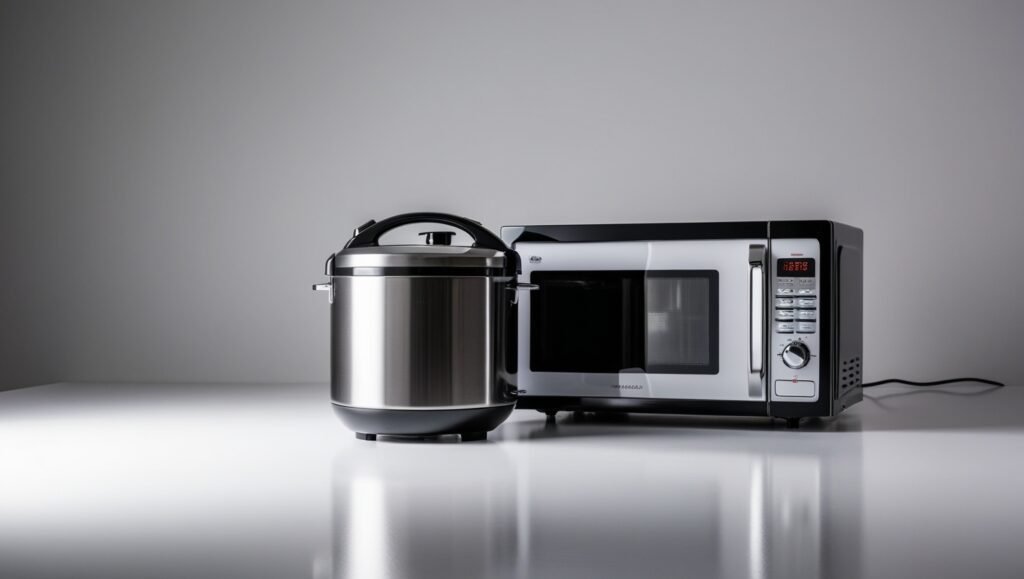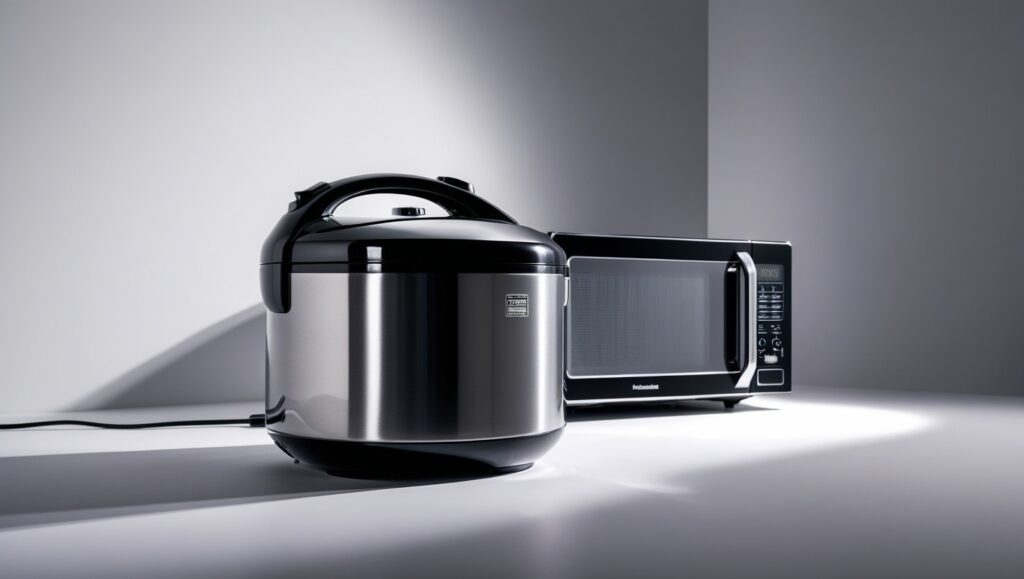When deciding between a rice cooker and a microwave, many people feel unsure. Both are common in kitchens, but which one suits your needs better? Rice cookers and microwaves offer different benefits. Rice cookers are designed specifically for cooking rice, providing perfect results every time. Microwaves, on the other hand, are versatile and can cook a variety of foods quickly. Understanding the strengths and weaknesses of each can help you make an informed decision.
This comparison will guide you through the key features and differences, helping you choose the best option for your cooking needs. Whether you seek convenience or specialized cooking, this guide will clarify the pros and cons of rice cooker vs microwave.
Convenience And Ease Of Use
Choosing between a rice cooker and a microwave can be tricky. Both have unique benefits. Let’s explore the convenience and ease of use of these kitchen gadgets.
Setup And Operation
Rice cookers are designed for simplicity. Just add rice and water. Then press a button. They have clear instructions. This makes them beginner-friendly. No guesswork is involved. You get perfect rice every time.
Microwaves are versatile. They can cook many foods. But cooking rice in a microwave requires more steps. You must measure rice and water. Then set the cooking time. Stirring halfway through is also necessary. This makes it less straightforward than a rice cooker.
User-friendly Features
Rice cookers often come with handy features. Many have timers and keep-warm functions. Some even have settings for different types of rice. These features make cooking rice almost effortless.
Microwaves also have useful features. They have preset programs for various foods. But not all microwaves have a rice-cooking preset. This means you must manually adjust settings. This adds to the complexity.

| Feature | Rice Cooker | Microwave |
|---|---|---|
| Ease of Setup | Very easy | Moderate |
| User Instructions | Simple | Complex |
| User-Friendly Features | Many | Varies |
| Cooking Steps | Few | Several |
Cooking Time
When it comes to choosing between a Rice Cooker and a Microwave for cooking rice, the cooking time is a key factor. Both appliances have their unique benefits and drawbacks. Let’s dive into the specifics of how long each takes to cook rice.
Speed Of Rice Cooker
A Rice Cooker is designed to cook rice perfectly every time. It typically takes around 20 to 30 minutes to cook white rice. For brown rice, it can take 40 to 50 minutes. The time varies based on the model and rice type. Rice cookers often have a keep-warm function. This allows you to prepare rice in advance and keep it warm until serving.
Speed Of Microwave
Using a Microwave to cook rice is faster. It usually takes about 10 to 15 minutes for white rice. Brown rice in a microwave may take 20 to 25 minutes. The microwave offers quicker cooking but requires more attention. You need to stir and check the rice often. This ensures it cooks evenly and doesn’t boil over.
Here is a simple comparison table:
| Appliance | White Rice Cooking Time | Brown Rice Cooking Time |
|---|---|---|
| Rice Cooker | 20-30 minutes | 40-50 minutes |
| Microwave | 10-15 minutes | 20-25 minutes |
The choice between a rice cooker and a microwave depends on your needs. If you prefer convenience and consistency, a rice cooker is ideal. If you need speed and flexibility, a microwave is the better option.
Versatility
Both rice cookers and microwaves offer different levels of versatility in the kitchen. Each appliance serves multiple functions beyond its primary use. Knowing their capabilities can help in making the right choice for your cooking needs.
Rice Cooker Capabilities
A rice cooker does more than just cook rice. Its versatility shines through various cooking methods and features:
- Steaming: Many rice cookers come with a steaming tray. You can steam vegetables, fish, or dumplings.
- Porridge: It can make oatmeal or other grain porridges.
- Slow Cooking: Some models have a slow cook function. Perfect for soups and stews.
- Quinoa and Grains: Easily cook quinoa, barley, or other grains.
- Cakes: Certain rice cookers can bake simple cakes.
Microwave Functions
A microwave oven is a staple in many kitchens due to its multifunctional capabilities:
- Reheating: Quickly warm up leftovers or pre-cooked meals.
- Defrosting: Thaw frozen food in minutes.
- Cooking: Make dishes like baked potatoes, steamed vegetables, or scrambled eggs.
- Baking: Use it for quick desserts like mug cakes or cookies.
- Popcorn: Enjoy freshly popped popcorn anytime.
Below is a comparison table of the versatility features of both appliances:
| Feature | Rice Cooker | Microwave |
|---|---|---|
| Steaming | Yes | Yes |
| Reheating | No | Yes |
| Defrosting | No | Yes |
| Slow Cooking | Yes | No |
| Baking | Yes (limited) | Yes |
Understanding these capabilities can help you decide which appliance fits your cooking style and needs best.
Energy Efficiency
Energy efficiency is a crucial factor to consider when choosing between a rice cooker and a microwave. Both appliances have their strengths, but their power consumption and environmental impact vary significantly.
Power Consumption
Rice cookers and microwaves consume different amounts of power. Here’s a comparison:
| Appliance | Average Power Consumption (Watts) | Usage Duration |
|---|---|---|
| Rice Cooker | 200-700 | 20-30 minutes |
| Microwave | 600-1200 | 5-10 minutes |
Rice cookers use less power but run longer. Microwaves use more power but cook faster. The total energy used depends on cooking time and the appliance’s power rating.
Environmental Impact
Using energy-efficient appliances reduces environmental impact. Consider these factors:
- Energy Source: Electricity from renewable sources is better for the environment.
- Efficiency Rating: Choose appliances with high energy efficiency ratings.
- Usage Patterns: Frequent use of high-power appliances increases energy consumption.
Rice cookers generally have a lower environmental impact due to lower power consumption. Microwaves may have a higher impact due to their power needs, but shorter cooking times can balance this.
Choosing the right appliance can save energy and reduce your carbon footprint.
Quality Of Cooked Food
Cooking rice can be a delicate task. The method you choose can affect the final quality of your meal. This section explores the quality of cooked food using a rice cooker versus a microwave. We will look at aspects such as texture, taste, consistency, and doneness.
Texture And Taste
A rice cooker often provides rice with a more consistent texture. The grains are usually fluffy and well-separated. This is because rice cookers use precise temperature control.
In contrast, microwaves may lead to uneven cooking. Some grains might be overcooked while others remain hard. This can affect the overall taste of the rice. Rice cooked in a microwave might also be drier compared to that cooked in a rice cooker.
Consistency And Doneness
When it comes to consistency and doneness, rice cookers excel. They ensure every grain is cooked evenly. The process is gradual, allowing for better absorption of water. This results in perfectly cooked rice every time.
On the other hand, microwaves can be hit or miss. The cooking process is fast, but not always even. You might end up with rice that is undercooked in some parts and overcooked in others. This inconsistency can be frustrating.
| Aspect | Rice Cooker | Microwave |
|---|---|---|
| Texture | Fluffy and well-separated | Often uneven and dry |
| Taste | Consistent and flavorful | Can be bland |
| Doneness | Evenly cooked | Often inconsistent |
Cost Analysis
Choosing between a rice cooker and a microwave can be tricky. Understanding the cost implications can help make the decision easier. Let’s break down the costs into initial investment and long-term expenses.
Initial Investment
The initial cost of a rice cooker ranges from $20 to $150. Basic models cost less. Advanced models with more features cost more. A microwave, on the other hand, typically costs between $50 and $300. A basic microwave is cheaper. High-end models with advanced settings are pricier.
| Appliance | Price Range |
|---|---|
| Rice Cooker | $20 – $150 |
| Microwave | $50 – $300 |
Long-term Costs
Long-term costs include energy consumption and maintenance. Rice cookers are energy-efficient. They use less electricity than microwaves. This can save you money on electric bills.
- Rice Cooker: Lower energy consumption
- Microwave: Higher energy consumption
Maintenance costs for both appliances are usually minimal. Regular cleaning and occasional part replacements might be needed. Microwaves might need more frequent repairs. This is due to their complex components.
- Energy Costs: Rice Cooker < Microwave
- Maintenance Costs: Similar for both
Considering both initial investment and long-term costs, a rice cooker might be the more cost-effective choice. Yet, a microwave offers more versatility. Each option has its own merits. Your choice will depend on your specific needs and budget.
Maintenance And Durability
When choosing between a rice cooker and a microwave, maintenance and durability are key factors to consider. Understanding how easy each appliance is to clean and how long they last can help you make a better decision. Let’s dive into the specifics.
Cleaning Process
Rice Cooker: Cleaning a rice cooker is usually straightforward. Most rice cookers come with a non-stick inner pot. This makes it easy to clean with a sponge and soapy water. Removable parts, such as the lid and steam vent, can be washed separately. Some parts may even be dishwasher-safe.
Microwave: Cleaning a microwave can be more challenging. Food splatters and spills can stick to the interior walls. Regularly wiping down the inside with a damp cloth helps. For tougher stains, use a microwave-safe bowl with water and lemon. Heat it up to loosen the grime, then wipe it clean.
Longevity Of Appliances
Rice Cooker: Rice cookers are known for their durability. A quality rice cooker can last for many years with proper care. The non-stick coating might wear out over time but is usually replaceable. Regular cleaning and proper use extend its lifespan.
Microwave: Microwaves can also be durable but may have a shorter lifespan compared to rice cookers. The average microwave lasts about 5-10 years. Frequent use and improper maintenance can shorten its life. Keeping it clean and using it correctly helps maintain its functionality.

Frequently Asked Questions
Which Is Better, Rice Cooker Or Microwave?
A rice cooker is better for cooking rice evenly. A microwave is faster but might not provide consistent results.
Can You Cook Rice In A Microwave?
Yes, you can cook rice in a microwave. Use a microwave-safe dish and follow package instructions.
How Long Does Rice Take In A Rice Cooker?
Rice typically takes 20-30 minutes to cook in a rice cooker. Cooking time varies by rice type.
Is Microwave Rice Healthy?
Microwave rice is healthy if prepared correctly. Avoid adding too much salt, butter, or oil.
Conclusion
Choosing between a rice cooker and a microwave depends on your needs. Rice cookers offer consistency and easy cooking for rice lovers. Microwaves provide speed and versatility for various dishes. Both have unique benefits. Consider your kitchen habits and preferences.
Make a choice that fits your lifestyle. Happy cooking!
